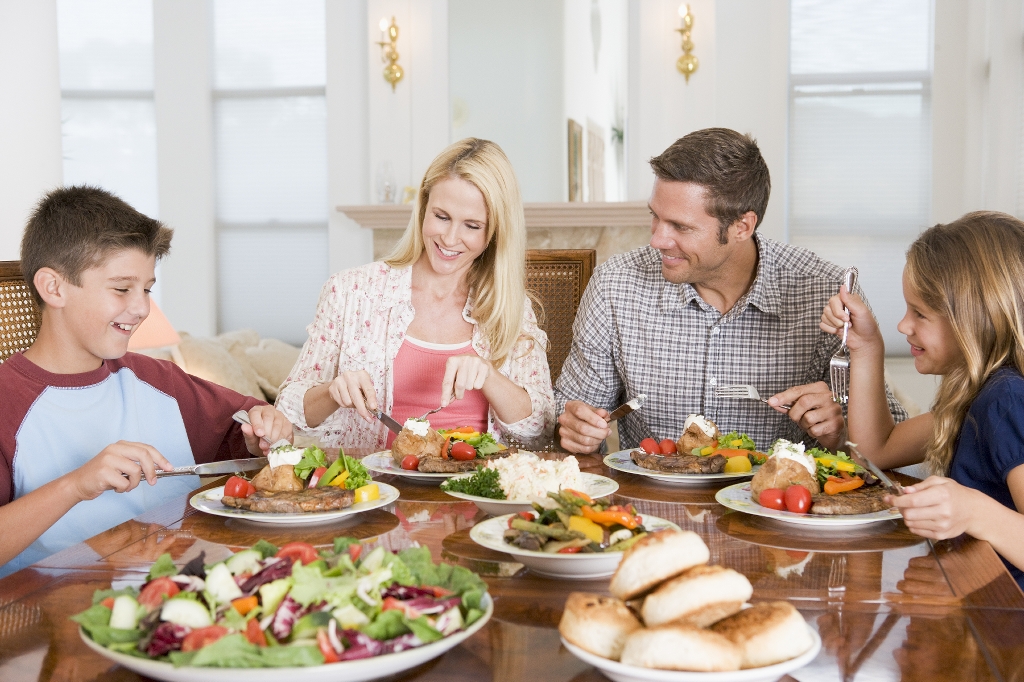One of the most common questions we’re asked about family road trips is: “How do you save money?” And there are always lots of questions about picky eaters, finding healthy food and sticking to schedules for smaller children. While a vacation rental be budget-friendly, it also doesn’t sound like much of a vacation if you have to do all the cooking. Our answer to that? Bring grandma for some free babysitting, er quality time with the kids and a little cooking. Seriously, that’s one of the best parts of a huge house in a spiffy locale — grandmas and grandpas are usually happy tome come along. But, if you’re still not convinced about cooking, we asked the experts at Home Away to give us some tips.
If you’ve never booked a vacation rental for your family holiday, I can hear the concern in your voice now. “I don’t want to have to cook! It’s my vacation!” The truth is that having a great place to stay—with a kitchen—is a key ingredient to making your vacation more relaxing and affordable.
Who Benefits?
The short answer is everyone: families, folks that want to relax instead of running out to lunch or dinner again, those with special diets, people with small children or picky eaters, large groups of friends who want to eat different things at different times…you name it. Usually it’s just easier and more affordable to eat at home.
Everyone will appreciate the convenience. For vegetarians, a vacation rental means a holiday of meat-free meals that they can trust. Families with children can have kid-friendly foods and healthy snacks handy at all times. No more fussing in restaurants and maybe even an opportunity for a quiet, grown-up dinner on the deck while the kids are inside watching a movie!
A Question of Cost
If the arguments above don’t sway you, how about the cost factor? Eating at home is almost always cheaper than eating in a restaurant. Multiply that by every member of your family, then by three meals a day, and then by the number of days you’re on vacation and the savings really add up.
Let’s take breakfast as an example. Breakfast in a family restaurant can cost roughly $8 to $10 per person for bacon and eggs, or up to $20 for a hotel buffet. That adds up to a family of four paying $40-$80 for breakfast. Over a seven-day vacation, that adds up to $280-$560 – just for breakfast.
Less than $50 buys enough eggs, bacon, bread, coffee, milk and cereal for the whole family for a week. That’s not even mentioning the fact that you can enjoy your breakfast in your pajamas. You can still splurge on a few dinners out – and should, you’re on vacation – but you’ll enjoy them more knowing how much money you’ve saved on your other meals.

For those that enjoy a nice glass of wine while watching the sunset: a bottle of wine at a restaurant with stiff chairs can cost $35 and up. The same wine from a local wine store, enjoyed on your backyard chaise lounge, costs less than $15.
What to Expect from Your Kitchen
Most vacation rentals will come with a stocked kitchen, including a stove, refrigerator, freezer, and a set of pots and pans, dishes, dishtowels, and cutlery. There will also likely be a coffee maker and a microwave, and often there is a barbecue outside. When you are booking your vacation rental, the owner can provide a full list of what is provided at the property. Read this carefully, so you will know what to expect when you arrive.
All you will need to bring is the food. Take a few minutes before you leave to plan your meals so you can maximize your savings and minimize waste. Avoid meals with many ingredients as this will drive up costs and lead to more waste. Unless you are within driving distance and have a reliable cooler, there is no sense buying a giant jar of mayonnaise or packets of specialty ingredients only used in one or two recipes as you’ll just end up throwing them out or leaving them behind.
The best meals you can make can stretch over a few days so you can make the most of your savings. Today’s barbecued steaks or chicken can easily be tomorrow’s sandwiches. Fresh fish and tossed salads don’t keep as well the next day.
Bring It From Home?
Consider packing some of your essentials and bringing them along. Making chili? Bring a small package of chili powder from home, as you’re only going to use a few tablespoons. Take along some of those take-out ketchup and mustard packages that are hanging around in your own kitchen.
If you’re driving, it’s easy to place a cooler in the trunk and fill it with whatever you need from home. Flying is more complicated, but as long as you abide by international regulations (no liquids), you can still put a jar of peanut butter or a box of cereal into your suitcase. If you are travelling to a foreign country, check with its customs office about what you are allowed to bring with you. Some destinations like New Zealand have a complete ban on bringing any food items into the country.
With less than a half an hour’s planning before you pack for your trip, you’ll find that cooking will actually help you enjoy your vacation better. There is no running around from restaurant to restaurant, no getting dressed before breakfast and no worrying that your kids haven’t eaten a vegetable in days. Best of all, cooking for yourself can mean more money in your pocket to spend on everything your vacation destination has to offer.
About the Author
Laura Hoot has been writing professionally since 2004 and manages HomeAway’s Travel Ideas site. She also runs a household of three dogs, a cat, two chickens and a baby boy along with her husband. She’s written for USA Today’s travel site, GirlsGetaway.com , Cheapo Air, Travels.com, Trails.com, eFilmCritic.com, The Budget Fashionista, Travellogged.com and many more sites.

